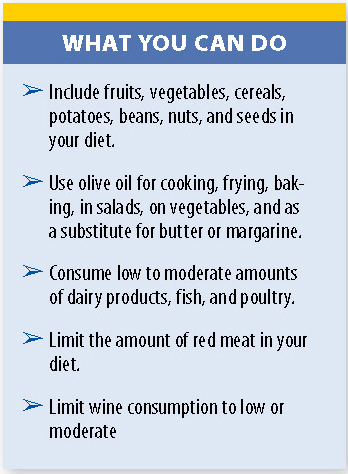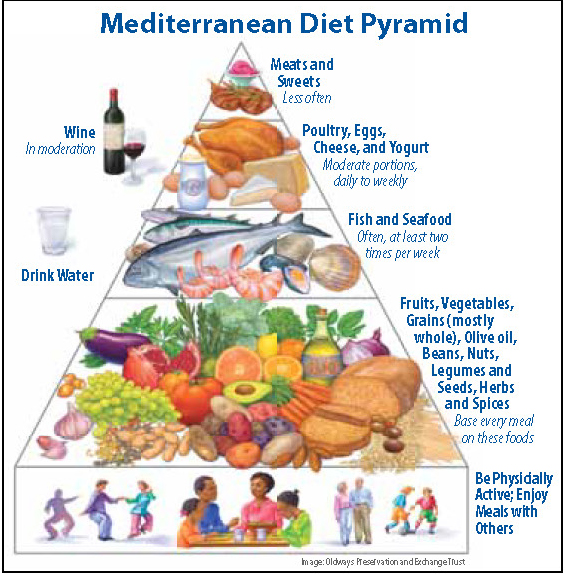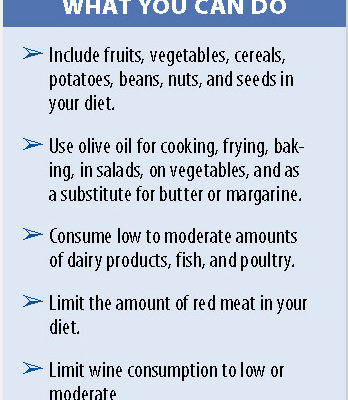A Mediterranean Diet May Reduce the Risk of Alzheimer’s and More
The Mediterranean diet has been associated with a lower risk for several diseases and risk factors, including cancer, obesity, high cholesterol, high blood pressure, problems with processing glucose that may lead to diabetes, coronary heart disease, and overall death rates.
 Now, research suggests that eating a Mediterranean-style diet is associated with a lower risk of developing Alzheimer’s disease. The diet may work through different pathways to reduce Alzheimer’s disease risk.
Now, research suggests that eating a Mediterranean-style diet is associated with a lower risk of developing Alzheimer’s disease. The diet may work through different pathways to reduce Alzheimer’s disease risk.
A Mediterranean diet emphasizes the importance of a diet rich in fruits, vegetables, cereals, fish, and whole grains, with minimal amounts of meat and dairy products for optimal overall health.
“Fruits and vegetables are very rich sources of antioxidants, as well as vitamins and minerals,” says Dana Ellis, RD, a clinical dietitian at UCLA Health System. “These antioxidants and certain vita-mins, especially B vitamins, maintain the health of cells and neurons. It would make sense that a diet rich in fruits, vegetables, lean proteins, nuts, legumes, and fish high in omega-3 would protect the brain’s function and reduce the risk of Alzheimer’s disease.”
The Mediterranean diet and metabolic syndrome
Metabolic syndrome (MetS) is a cluster of factors that raises your risk of diabetes, heart disease, and stroke. The factors include high blood pressure, elevated insulin levels, excess abdominal fat, high levels of triglycerides (blood fats), and reduced levels of HDL (“good”) cholesterol. If three or more of these five factors are present, you have MetS.
Research has shown that dining Mediterranean-style helps reduce the risk of MetS. “According to research, the benefits of the Mediterranean-style diet were seen in all MetS criteria, including favorable changes in waist circumference, improvements in HDL values, and reduction in triglycerides, blood pressure, and blood sugar. In general, greater adherence to a Mediterranean-style diet was associated with a lower incidence of MetS,” explains Susan Bowerman, MS, RD, CSSD, a registered dietitian at UCLA Health System.
Incorporating the Mediterranean diet into your life
A Mediterranean-style diet has several distinguishing features. “One key aspect is that it is rich in monounsaturated fatty acids from olives and olive oil; an-other is that it is almost a semi-vegetarian diet, since it emphasizes daily consumption of fruits, vegetables, whole grains, and low-fat dairy products, and weekly consumption of nuts, beans, fish, and poultry,” explains Bowerman. Red meat is limited to twice a month or less, and alcohol consumption is moderate, typically consisting of a glass of wine with meals.
A Mediterranean-style diet focuses on whole foods; packaged, processed foods that often contain refined flour, added sugar, excessive sodium, and various additives and preservatives are avoided.
“Some people erroneously assume that the primary emphasis of the diet is the impact of olive oil in-take, and believe that simply switching from other dietary fats and oils to olive oil will provide the same health benefits of the Mediterranean diet. However, using olive oil in an otherwise Western dietary pattern will not confer the same benefits, so it’s important to take note of the diet in its entirety,” advises Bowerman.

The post A Mediterranean Diet May Reduce the Risk of Alzheimer’s and More appeared first on University Health News.
Read Original Article: A Mediterranean Diet May Reduce the Risk of Alzheimer’s and More »
Powered by WPeMatico


